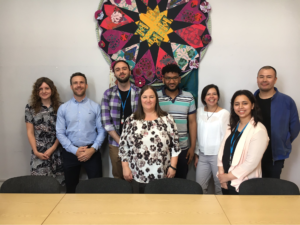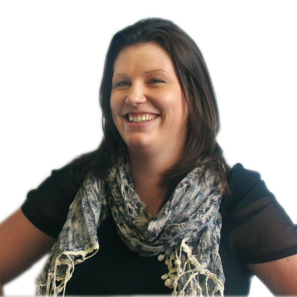Bigger than the sum of its parts: A network for social change
Head of the Online Centres Network, Gabrielle Woodhams, explains a bit about the network, and we hear from Zest, a community partner in Sheffield.
I feel lucky to be able to make a real difference in my job role. I lead the team who manages and supports the Online Centres Network on a daily basis. My team work incredibly hard, day in, day out to support the network to be the best that it can be.
The Online Centres Network is the beating heart of our organisation and without it we could not deliver our many different projects or achieve our ambitious goal of supporting 3 million socially excluded people to improve their lives through digital by 2020. Helen calls the network a big club with a shared vision and I think that sums it up perfectly. There are thousands of organisations in the network who are working hard to improve the lives of individuals in their local community. It’s a movement where hyperlocal and committed groups of organisations are working tirelessly together for social change.

Each Online Centre is different and separate from Good Things Foundation. The Online Centres Network isn’t a franchise. There is no formula; they are all independently owned, managed and funded. The common bond is a shared vision of a 100% digitally skilled nation, a commitment to provide free or low cost support to help people learn how to use the internet, and a passion for improving the lives of individuals within their local community.
In the last 12 months I’ve visited a number of Online Centres and I’m blown away by each and everyone of them – Edlington Hilltop in Doncaster, Starting Point Community Learning Partnership in Stockport, Destinations@Saltburn in North Yorkshire, SmartLyte in Birmingham, Learn for Life in Sheffield, First Asian Support Manchester, Alpha Tutorials in Leicester, Hackney Cooperative Developments in London, Single Homelessness Project, London and Heeley Development Trust in Sheffield, Newcastle City Library in Newcastle and Age UK Richmond in south west London. Each organisation is led by an inspirational individual or group of people who are the driving force behind social change.
Online Centres are often found in community centres and public libraries, but they can also often be found in village halls, places of worship, community cafes, social housing, on mobile buses and even in pubs. Many are local community organisations who also support people through other learning, for example learning to speak English as a second language, or learning other computer skills. The definition of an Online Centre is not fixed – it could be a computer in a village hall, four laptops or tablets taken into a pub on a Friday morning, or 25 computers in a school being used in the evening. Each centre is based on the needs of the individual community it serves.
The majority of Online Centres do something else as well as digital skills support, such as run a community venue, provide ESOL support, run food banks, host a youth club or older people’s club, offer other informal or formal learning, loan books and provide health support – the list goes on!
The uniqueness of each Online Centre and the people who run them is what creates the magic. I recently visited the Zest Centre at Upperthorpe in Sheffield along with members of the Good Things Australia team and some new starters from the UK office to show them just how great they are. Zest is an ecosystem for the community and holistically supports families to improve their lives.
The visit amazed us all to see just how committed Matt, Lynsey and the team are to improving the lives of their local community and it was good to hear how they see the bigger picture – strategically – and knit projects together to ensure that they are a sustainable organisation.
The money doesn’t flow easily and Matt, the CEO, explained how hard it is to balance the books to ensure that they can continue to deliver support to those with the greatest need. He said “The healthy life expectancy gap between the most poorest and most affluent areas of Sheffield is 8 years. This inequity drives our ambition to ensure everyone in our community has the opportunity to better themselves and improve their quality of life. We strive to achieve the best personal outcomes by navigating individuals and families through a tailored journey of support that can involve accessing a range of joined up wellbeing support services provided and hosted by Zest”. It’s an ambition that we can recognise – it’s the same as ours and that of thousands of other organisations in the Online Centres Network. The network really is a big club with a shared vision for social change.
I also get the opportunity to meet lots of individuals who work or volunteer at Online Centres in different events throughout the year – our conference, training events, workshops and focus groups. I’m constantly listening to the feedback I receive and as a team we are striving to ensure that the membership offer is the best that it can be.
I’d like to say a big thank you to the Online Centres Network – we cannot do what we do and have the reach that we have without you.
Immersing myself in the community context helps with my strategic thinking and network development planning so if you’d like me or one of the team to come along to your Online Centre please do let me know. Developing the Online Centres Network is one of my biggest priorities. We want the network to develop and thrive in the coming years and in my next blog I’ll talk about the work that we’ve done over the past 12 months and what we’ve got planned for the future.

Gabrielle Woodhams
Head of Network
Gabi leads the strategic plan for the Online Centre’s network which drives the long-term sustainability, success and impact of the network as a whole to deliver social & digital inclusion at scale.
